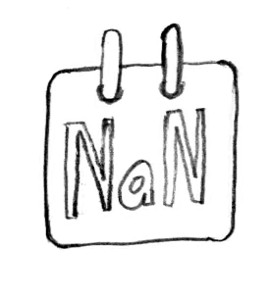Divide-by-zero days

It's pretty convenient that brains seem a lot more tolerant of nonsense than computers. Specifically, it's fortunate that, however we're wired, "this statement is false" doesn't send us into paradoxical paroxysm. It's not clear that an artificial intelligence would necessarily fall foul of that problem either, but there are a lot of ways in which the inherent rigour of computers seems to make things more difficult than the fuzzy logic and forgiveness of our fleshy processing units.
On the other hand, I think there are some interesting parallels between the failure modes of formal systems and failure modes of our informal equivalents. In (non-exotic) mathematics, division by zero is undefined. On a computer, division by zero will variously return infinity, blow up or return a Null. Luckily we are not affected by such trivial problems! Well, maybe...
A wonderful reddit comment from a while back defined the "zero day", a day where you make no progress towards your goals. The author insists that zero days are the absolute number-one thing to avoid, and my experience agrees: they are uniquely demoralising. So why is this? Obviously to some extent it just feels bad to not achieve goals, but why does it feel so much worse to get nothing done than to get nearly nothing done?
My theory is that we extrapolate out from our present conditions when we think about the future. So our information about the future depends on our information about the present. The less we're doing in the present, the less information we have. If we work all day we have a fairly robust estimate of how much work we can achieve in a week. If we work for an hour that estimate is less reliable.
But if we don't do any work at all, we have no basis for a prediction. Our estimate is undefined: a divide-by-zero.